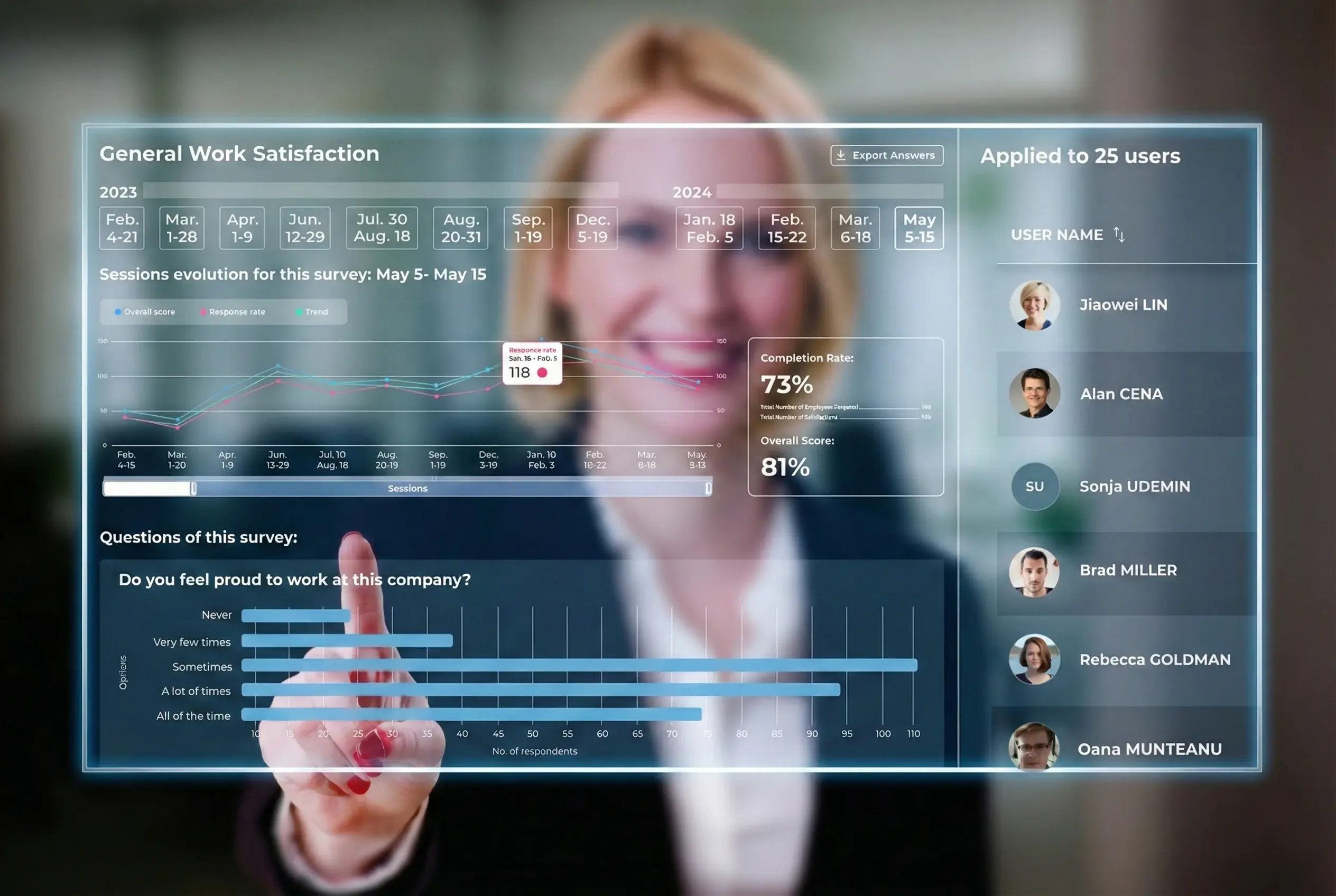SECTION
Is Your U.S. HR Software a Hidden GDPR Risk? A Strategic Guide for HR Leaders

Listen to this article:
Every company deserves an HR solution that understands its unique needs and complies with regulatory standards. With growing concerns around cross-border data access, European companies struggle to find an HR platform that is both reliable and cost-effective.
Moreover, the legal and financial risks of using US-based HR platforms for European employee data have increased significantly. The core issue is a fundamental conflict between EU privacy law and U.S. data access laws, which places your organization in a legally precarious position.
This article highlights the primary risk areas, ranging from unlawful data transfers to misplaced liability, and provides a strategic framework for conducting due diligence. The objective is to equip you with the necessary insights to challenge vendor claims, negotiate stronger protections, and make informed decisions about your HR tech stack.
The high-stakes world of HR data
Employee data is considered personal data and, therefore, falls under the protection of the General Data Protection Regulation (GDPR). Collecting it is a high-risk activity, so it requires a deep understanding of the law.
This places HR data processing in the highest tier of regulatory risk, where fines can reach up to 4% of a company's global annual turnover. Understanding the fundamentals is not optional, and you and your HR vendor must ensure transparency, security, and compliance.
GDPR fundamentals for HR
- All HR data processing must adhere to the GDPR's seven core principles: Lawfulness, Fairness & Transparency; Purpose Limitation; Data Minimization; Accuracy; Storage Limitation; Integrity & Confidentiality; and Accountability. As the data controller, your organization is responsible for demonstrating compliance with all seven.
- Relying on employee consent as a legal basis for processing core HR data can sometimes be considered invalid under GDPR. Due to the power imbalance in the employment relationship, consent can’t be considered "freely given." Instead, you must rely on other legal bases, such as "performance of a contract" or “legal obligation" for essential processing (like payroll) or "legitimate interests" for other activities, which require a documented balancing test.
- Data Subject Rights (DSRs): GDPR grants employees powerful rights over their data, including the right to access, correct, and erase their information. Your HR platform must be able to facilitate these requests promptly and thoroughly.
The transatlantic data transfer challenge
Although GDPR is an EU law, it must be followed by any U.S. business that collects personal data from EU citizens. Companies must ensure that any partners they work with are GDPR compliant, since they may be held partially liable if their partners break GDPR.
In 2020, the EU’s highest court, in the landmark Schrems II ruling, invalidated the previous data transfer framework because it found that U.S. surveillance laws don’t provide EU citizens with adequate protection or legal redress.
This ruling established that the issue is not a matter of a vendor's security measures but rather the legal environment of the U.S. itself. While a new EU-U.S. Data Privacy Framework (DPF) is in place, it faces legal challenges, and its long-term viability is uncertain.
Therefore, the applicable legislation requires your organization to conduct a Transfer Impact Assessment (TIA) for any data sent to the U.S. A TIA is a documented assessment to verify if U.S. laws prevent your vendor from protecting the data to EU standards. This difficult and legally perilous obligation rests entirely with you, the customer.
Why switch from U.S. to EU tools? The EU-native advantage
When evaluating HR software, the vendor's jurisdiction should not be just a detail but a fundamental element of the buy-in process. The difference between HR software built in the U.S. versus one built within the EU is significant. Let’s see what the key differences are:
U.S. HR tools
HR platforms based in the U.S. were often designed before GDPR even existed, for a market with different privacy norms.
They must sometimes navigate the complex and legally uncertain territory of transatlantic data transfers, a risk that is passed down to you, the customer. However, there are U.S. companies that store data only in the EU, and therefore, there is no question of transferring it outside the EU, such as Microsoft.
These tools have U.S.-based servers & data, generic workflows, high switching costs, the risk of policy divergence, and are usually limited to English.
EU HR tools
In contrast, platforms developed within the EU are built on a foundation of GDPR. Principles like data minimization, purpose limitation, and robust DSRs are core requirements from day one. EU tools offer the following advantages:
- Mitigate data transfer risk by processing and storing data exclusively within the European Economic Area (EEA) and utilizing only EEA-based sub-processors. This way, the entire data transfer problem is eliminated, so there is no need for a TIA because the data never leaves the EU's legal jurisdiction.
- The vendor operates under the same legal and regulatory framework as you do. Their understanding of concepts like "legitimate interests" and the invalidity of employee consent is native, not learned.
- Your due diligence can focus on the platform's security and functionality, rather than on the complex and high-stakes legal analysis of a foreign nation's surveillance laws.
This debate ultimately led to the Buy European Initiative, which encourages consumers to choose European products and services to support local economies and promote sustainability.
Mirro is a European HR software that gives you:
✅ Full GDPR compliance with EU-hosted data
✅ 100% European-built and owned software
✅ Multilingual capabilities & local HR compliance modules
✅ Personalized support and fast response times
By choosing Mirro, you’re not only getting a top-tier HR software solution but also contributing to the growth of European technology and innovation. #BuyFromEU
Mirro HR Software: Built in Europe. Trusted by European Teams
You may also be interested in:
How the EU pay transparency directive is reshaping compensation transparency and what HR teams must prepare for.
A strategic framework for due diligence
To move from a position of risk to one of control, you must treat due diligence as a strategic imperative. Incorporate these critical questions into your procurement and review processes to make sure your HR software is GDPR compliant:
Data Transfers & Transfer Impact Assessment (TIA)
"Can you provide a complete data flow diagram for our EU employee data, including all sub-processor locations, and provide the specific information we need to complete our TIA under the applicable GDPR framework?"
DSR
"Please provide a live demonstration of how your system handles a 'right to erasure' request, and how you provide an auditable log proving the data has been permanently removed from all systems, including backups?"
Liability & Data Processing Addendum DPA
"Could you walk us through the liability clauses in your (DPA) as they relate to a data breach?”
Sub-processor Management
"Could you walk us through the process of vetting and adding new sub-processors?"
From risk mitigation to strategic advantage
The legal landscape for using U.S.-based HR software in the EU is complex, and the responsibility for navigating these challenges rests with you as the data controller.
By adopting a framework of rigorous due diligence, you can move beyond vendor marketing and establish a list of requirements that demand the necessary safeguards for compliance. A key part of this strategic assessment is considering the vendor's jurisdiction. Platforms developed within the EU, such as Mirro, are built from the ground up with GDPR in mind, making your data collection and processing safer from the outset.
This is about more than software. It's about making a statement. If you want to be part of a bigger shift, buy European.







